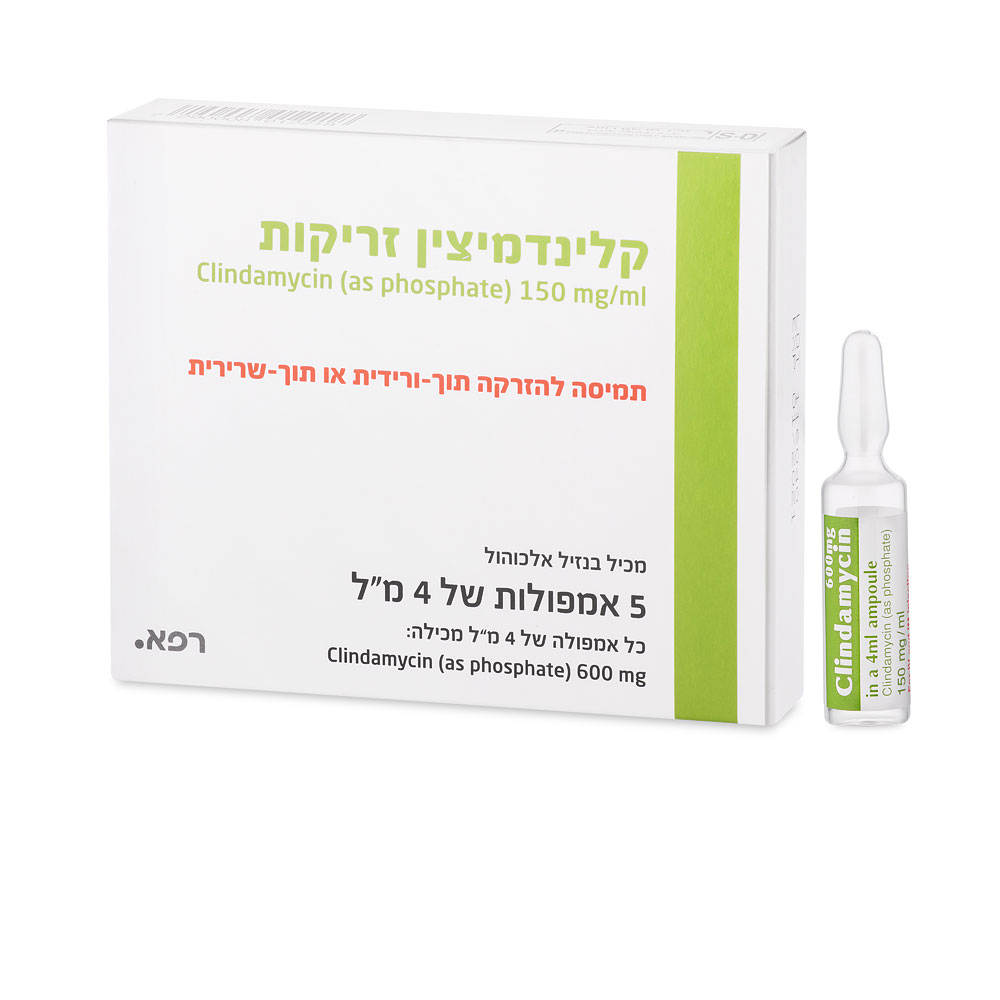Quest for the right Drug

קלינדמיצין זריקות CLINDAMYCIN INJECTIONS (CLINDAMYCIN AS PHOSPHATE)
תרופה במרשם
תרופה בסל
נרקוטיקה
ציטוטוקסיקה
צורת מתן:
תוך-שרירי, תוך-ורידי : I.M, I.V
צורת מינון:
תמיסה להזרקה : SOLUTION FOR INJECTION
עלון לרופא
מינוניםPosology התוויות
Indications תופעות לוואי
Adverse reactions התוויות נגד
Contraindications אינטראקציות
Interactions מינון יתר
Overdose הריון/הנקה
Pregnancy & Lactation אוכלוסיות מיוחדות
Special populations תכונות פרמקולוגיות
Pharmacological properties מידע רוקחי
Pharmaceutical particulars אזהרת שימוש
Special Warning עלון לרופא
Physicians Leaflet
Special Warning : אזהרת שימוש
Warnings This product, Clindamycin Injections, contains 10 mg/ml benzyl alcohol. The preservative benzyl alcohol may cause hypersensitivity reactions. Intravenous administration of benzyl alcohol has been associated with serious adverse events, and death in paediatric patients including neonates (“gasping syndrome”). Although normal therapeutic doses of this product ordinarily deliver amounts of benzyl alcohol that are substantially lower than those reported in association with the “gasping syndrome”, the minimum amount of benzyl alcohol at which toxicity may occur is not known. Benzyl alcohol containing formulations should only be used in neonates if it is necessary and if there are no alternatives possible. Premature and low-birth weight neonates may be more likely to develop toxicity. Benzyl alcohol containing formulations should not be used for more than 1 week in children under 3 years of age unless necessary. It is important to consider the total quantity of benzyl alcohol received from all sources, and high volumes should be used with caution and only if necessary, especially in patients with liver or kidney impairment, as well as in pregnant or breast- feeding women, because of the risk of accumulation and toxicity (metabolic acidosis). Severe hypersensitivity reactions, including severe skin reactions such as drug reaction with eosinophilia and systemic symptoms (DRESS), Stevens-Johnson syndrome (SJS), toxic epidermal necrolysis (TEN), and acute generalized exanthematous pustulosis (AGEP) have been reported in patients receiving clindamycin therapy. If a hypersensitivity or severe skin reaction occurs, clindamycin should be discontinued and appropriate therapy should be initiated (see sections 4.3 and 4.8). Clindamycin Injections should only be used in the treatment of serious infections. In considering the use of the product, the practitioner should bear in mind the type of infection and the potential hazard of the diarrhea which may develop, since cases of colitis have been reported during, or even two or three weeks following, the administration of clindamycin. Treatment with antibacterial agents alters the normal flora of the colon leading to overgrowth of Clostridium difficile. This has been reported with use of nearly all antibacterial agents, including clindamycin. Clostridium difficile produces toxins A and B which contribute to the development of Clostridium difficile associated diarrhea (CDAD) and is a primary cause of 'antibiotic-associated colitis'. The disease is likely to follow a more severe course in older patients or patients who are debilitated. Diagnosis is usually made by the recognition of the clinical symptoms, but can be substantiated by endoscopic demonstration of pseudomembranous colitis. Colitis is a disease, which has a clinical spectrum from mild, watery diarrhea to severe, persistent diarrhea, leucocytosis, fever, severe abdominal cramps, which may be associated with the passage of blood and mucus. If allowed to progress, it may produce peritonitis, shock and toxic megacolon. This may be fatal. The presence of the disease may be further confirmed by culture of the stool for C. difficile on selective media and assay of the stool specimen for the toxin(s) of C. difficile. It is important to consider the diagnosis of CDAD in patients who present with diarrhea subsequent to the administration of antibacterial agents. This may progress to colitis, including pseudomembranous colitis (see section 4.8), which may range from mild to fatal colitis. If antibiotic- associated diarrhea or antibiotic–associated colitis is suspected or confirmed, ongoing treatment with antibacterial agents, including clindamycin, should be discontinued and adequate therapeutic measures should be initiated immediately. When 125 mg to 500 mg of vancomycin are administered orally four times a day for 7 - 10 days, there is a rapid observed disappearance of the toxin from faecal samples and a coincident clinical recovery from the diarrhea. Drugs inhibiting peristalsis are contraindicated in this situation. Hypertoxin producing strains of C. difficile cause increased morbidity and mortality, as these infections can be refractory to antimicrobial therapy and may require colectomy. CDAD must be considered in all patients who present with diarrhea following antibiotic use. Careful medical history is necessary since CDAD has been reported to occur over two months after the administration of antibacterial agents. Excipient information Clindamycin Injections contain about 7 mg/ml sodium. Precautions Caution should be used when prescribing Clindamycin to individuals with a history of gastro- intestinal disease, especially colitis. Since clindamycin does not diffuse adequately into cerebrospinal fluid, the drug should not be used in the treatment of meningitis. If therapy is prolonged, liver and kidney function tests should be performed. Such monitoring is also recommended in neonates and infants. Safety and appropriate dosage in infants less than one month old have not been established. Acute kidney injury, including acute renal failure, has been reported infrequently. In patients suffering from pre-existing renal dysfunction or taking concomitant nephrotoxic drugs, monitoring of renal function should be considered (see section 4.8). The use of clindamycin phosphate may result in overgrowth of non-susceptible organisms, particularly yeasts. Prolonged administration of Clindamycin Injections, as with any anti-infective, may result in super- infection due to organisms resistant to clindamycin. Care should be observed in the use of Clindamycin Injections in atopic individuals. Clindamycin Injections should not be injected intravenously undiluted as a bolus, but should be infused over at least 10-60 minutes as directed in section 4.2.
Effects on Driving
4.7 Effects on ability to drive and use machines Clindamycin Injections have no or negligible influence on the ability to drive and use machines.

שימוש לפי פנקס קופ''ח כללית 1994
התרופה תימצא רק בבתי חולים ותנופק לחולים אמבולטורים רק באמצעותם
תאריך הכללה מקורי בסל
01/01/1995
הגבלות
תרופה אשפוזית לפי החלטת משרד הבריאות
מידע נוסף
